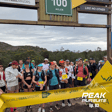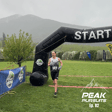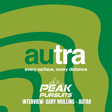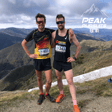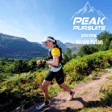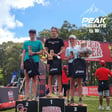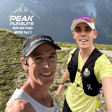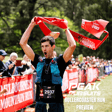Become a Creator today!Start creating today - Share your story with the world!
Start for free
00:00:00
00:00:01

Trail to South Korea - Episode 3
Welcome to Episode 3 of the Trail to South Korea!
In this ep, hear about a hiccup in Sarah's training as she navigates illness and moving state, and a rundown of what a massive training camp week in Bright looks like for Mikey and Charlie.
The crew then talk everything nutrition and gear - from training nutrition, sweat rates, belt vs pack, the weight of gear, shoe choices, and more! Many little gems of info for runners of all levels in this one.
Thanks for listening!
Sarah: @sarahludo
Charlie: @cowboyhamilton
Mikey: @mikey_dimuantes
Music from #Uppbeat (free for Creators!): https://uppbeat.io/t/moire/new-life License code: VJ9EPZM2AQUSWRXL
Transcript
Introduction to the Episode and Athletes
00:00:28
Speaker
Hello and welcome to episode three of the trail to South Korea. My name is Simone Brick. I am here hosting with our three awesome athletes that are going to be heading across to South Korea in a few weeks time now. It's getting actually pretty close now that I think about it.
00:00:48
Speaker
And that is Sarah Ludoichi, who is looking very summery currently in Norseman. How are you doing, Sarah? Um, I'm actually really sick. So, um, but other than that, I'm great.
00:01:00
Speaker
which
00:01:04
Speaker
love that it an odd smell Looking on the bright side, actually don't love the sickness, but definitely love it. I'm on the way out, which is good. Okay. Good. Good. Good. Good. We
Training Challenges and Setbacks
00:01:15
Speaker
like that. And, uh,
00:01:16
Speaker
the dynamic duo of Charlie and Mikey together on the ah call again. How are we doing, boys? Good. We're excellent. We're down in Bright on a little training camp. Nice. Training camp. Just finished a bowl of Coca Pops each. Awesome. But this week, we're going to chat through your training as usual. For everyone, it's going to be a little bit different because Sarah's on the move and Charlie and Mikey have been at training camp. So it's going to be interesting to hear how Bright's been for you guys.
00:01:45
Speaker
And then we are gonna chat all things gear and nutrition for the race. um I got the mandatory equipment up and nutrition is always a hot topic. So Sarah, I'm gonna start with you ah because we are working off maybe some sim laptop charge of only 14%, but how has the week been, especially with the fact that you're currently in the middle of a very big drive across the country?
00:02:12
Speaker
Um, yeah, this week has not been good at all. I guess this means I'll be quite short on my summary, but, um, yeah, no, I guess i got I actually got hit with sickness, um, earlier, maybe back end of last week and I've, yeah, I've sort of not been able to train well at all this week. Um, I, yeah, shortened my long run last weekend, um, just cause I wasn't feeling really good. Um,
00:02:38
Speaker
had a rest day Monday and then went out for a session on Tuesday, but had to pull that one right back and then essentially have gotten significantly worse since then um and haven't been able to do anything for really three days now. But so today was the turning point morning, so I feel good um and hopefully we'll get out for a run tomorrow and we do pass through the Blue Mountains on the way home. So I'm like, I don't care if you just drop me in the Blue Mountains and Barton keeps going to Sydney. We're like, I'm gonna run in the mountains. Like hopefully get some good, good runs in the mountains on the way. That's what's keeping me going. Nice. That's one way to cram the training back in. Just get dropped in the Blue Mountains and run to Sydney. Yeah. Yeah, exactly. Exactly. Um,
00:03:32
Speaker
But, you know, like I always, you know, I always think it, you know, this time it's, it's never, there's no point in pushing. It's not going to, not going to make me feel any better any sooner. um And it's always just being like, you know, trusting that, you know, I've done, you know, I've been training consistently for years. So what's a couple of days in consistent years, even though it's obviously not ideal.
00:03:53
Speaker
um you know, you've just got to do the best that you can really. So I feel like there's no point stressing out about it and just trying to, when I feel good, like focus on getting better and feeling good and then get back to it when I can. Nice. Ludo, when you're say pulling out of a long run or a session, like do you have like a cut at where, like when do you make that decision that you're going to stop the session? Is it, you know, before you head out, is it on the long run? Like when is it?
00:04:26
Speaker
okay Um, typically, typically, like, I guess, ah like a strategy for me, that, you know, if I wake up in the morning and I'm like, not mentally feeling great, I might go, okay, well, let's just, you know, let's just go for five minutes and see how you feel. And if at the end of that five minutes, you, um, still feel like shit, then turn around and go home and see your day to rest. Um, but more often than not, and I'd probably say like 95% of the time I get through, um,
00:04:56
Speaker
get through that and go on to do my session or or sometimes I just give a different focus. Like I remember one tempo run, um I sort of just called it the turnaround tempo because I wasn't feeling good when I started and I was like, you know what, you're going to feel shit in a race. Like, you know, even if you feel bad at the beginning of a hundred K race, like you can turn it, you've got many moments to turn it around. So make it the turnaround session. And so, um,
00:05:23
Speaker
Yeah. I remember in like in that particular session, like I i literally got to the turnaround point halfway turnaround and I felt amazing. Like, so I was like, yeah. So sometimes it's just like, it's like sticking with it. But on this one, I can't say that you just got a big tailwind on the weekend. Yeah, pretty much. Um, but yeah, in this, in the, on the, on the weekend, there was just a, I think I'd had a rough few kind of days leading in where I'd had a bit of low fatigue and,
00:05:51
Speaker
I even starting like the long run, I was like, um like in the first five Ks, I was like, oh man, I don't know if I've got this in me, but I was like, just just like go and do like, just go and do like at least 20K, like just do it. And I got to, yeah, I got to just over 20K. But yeah, I think because I didn't, I didn't, I didn't continue to improve and I kind of started to feel, yeah, not great. So I just thought it was sensible.
00:06:21
Speaker
Um, it's a hard decision. It's a hard decision to make. I find because, you know, you have a little bit of self-talk. You like, am I just being soft or blah, bla blah, blah. I actually think in the end, if you start to think to yourself, I'm going to pull out of this session, then just pull out of it because you really gain your thing after that. And, and you're right with the amount of running you've like people do over time. What's one session, you know? Yeah.
00:06:47
Speaker
Yeah, no, that's a good point. um I guess I always like to think that, um yeah, like usually it comes good and you get into it or, and you you know, you ride the waves of it and sometimes there's just more waves, like lower waves in in a training session than there is the good good ones.
Strategies for Race Preparation
00:07:06
Speaker
um But yeah, it's it's just sort of been a,
00:07:12
Speaker
a shit week. Yeah, sounds I think it's interesting, because these ones, weeks like that can often play with you more mentally than physically. Because at the end of the day, as you said, it's a few days, it's a couple of runs in the bulk of a massive amount of work. So met physically, once the sickness is gone, your body's just as fit as it was a week ago. um So, but mentally, that's where the game start to come in. And I think that whole mental talk, I just keep reminding myself when I'm having a session like that where I'm like, Ooh, there's a gut feeling when you know that it's a bad idea. Like it's a different to being, okay, this is hard and I want to pull out, but I know I kind of just have no reason and my brain's chucking excuses at me.
00:07:57
Speaker
Um, yeah and that's where I have this mental strategy of going, okay, is what's going through my brain a reason to stop? Like I'm feeling sick, something hurts, blah, blah, blah. Or is it an excuse? And I always push through the excuses, but if it's a reason, I go, okay, I got to listen to that one. So that's my sort of delineation in the sand of going,
00:08:20
Speaker
There's a big difference there um for me because you want to always push through the excuses and sort of try and listen a bit to the reasons of doing things. um But yeah, you you I think you're playing it right because at the end of the day, if you have to rest even harder for three days to then feel better sooner, that's only going to serve you in for the race.
00:08:44
Speaker
Yeah, absolutely. And I like to think that, you know, i've I've been training long enough that I have a good gauge of like what is like, what is normal and okay, like fatigue to push through and what is not normal and not usual um fatigue to push through and just got to listen to that.
00:09:05
Speaker
Yeah. Now you get to do a reverse taper into the race and, uh, get, gain some momentum again. say So sometimes that can, that can bode really well. Your legs are overall fresher going into the last little bit of training. Yeah, absolutely. And I also figured for me, 40 K is a relatively short distance. So I'm like, yay, it's fine. Like 40 K is not not that like, yeah, not that much difference, even if I did only get 20 K's on, you know, so anyway, we've still got time.
00:09:36
Speaker
Nice. Definitely still got time. And so just talk us the next, how long until you're through the drive? How many days? but Um, so, uh, I don't know. We're trying to go as quickly as possible. Um, so hopefully maybe, what have we got? Another maybe,
00:09:57
Speaker
3,500 Ks to go. So yeah, we started at 5am and we'll probably finish at 6pm tonight and this is my break so that's why I'm like moving on the spot. sorry yeah cause like otherwise and all day um It's actually been really good being sick for the drive because I've actually been like just chilled.
Training Routines and Nutrition
00:10:21
Speaker
Yeah. Fair. Fair call.
00:10:25
Speaker
Have you got like a trailer with your entire life in that car currently? Um, I don't know if you can see it. Probably not. Um, like we know we shipped, we shipped some stuff over and then we've got just our car packed with, um, uh, like everything else. Yeah. There's like a whole bag of shoes on there. It's like an enormous bag. Anyway. and yeah Got the important things then. Yeah.
00:10:55
Speaker
Oh, I love it. Running shoes, everyone. Not high heels or anything like that, just in case. No, I totally pegged you as a high heel aficionado. Well, I am short, so.
00:11:10
Speaker
Oh, goodness. Nice. Well, soon, I think by next week then, you'll be in Canberra, um joining there joining Mikey and Charlie, which will be cool. But taking it now to Canberra,
00:11:23
Speaker
Charlie, how's your week been overall? Um, yeah, really good. So when did we speak last on Friday? Um, we drove to bright on Saturday. Yep. How long's that drive for you? Oh, like four and a half hours is pretty on nice. Um, and we've been here since then. So I think like eight days total, um, went for a ride and a run Saturday Sunday. We did a long run.
00:11:53
Speaker
ah We did two lots of buffalo. um all like one One in a bit. We did 2,000 meters, so we literally like did one up, came down, turned around and ran up. We hit 2,000 meters and then came back down. yeah So that was 33K, 34? Yeah, 34. 2,000. So that was pretty good. And then Monday, just Easy run and ride. Tuesday we did, I think I did 18K, we'd like maybe 800 meters.
00:12:30
Speaker
um We might as well go through our weeks at the same time. Yeah. Yeah, I was gonna say. If you just did the same thing, just run us through it together. Yeah. I mean, the point of difference there was I did like maybe one kilometer less and did some surges. so and So I was just getting a little bit more little bit more distance there. yeah I love that the ah the long distance guy did the surges and the shorter distance guy did the longer distance. Love that. Yeah, exactly. um Then Wednesday we did an awesome loop.
00:13:01
Speaker
Yeah, we did Northwest spur to almost a feather top and then around and we pretty much did the GSCR 25K look pretty much. So it's like starting in Harryville. 5K on the flat and then you climb a thousand meters in 4K and then you continue to climb a little bit. Yeah. So you climb, I think we did 1400 meters total. Yeah. And it's like one climb. Yeah.
00:13:24
Speaker
which is nice and really steep as well, which is good. We cruised that and then Mark did a little workout towards the top. Yeah, we did like, I did like two by 20 minutes kind of towards the top of the climb. So like we did half an hour on the climb and then 20 minute low tempo push, yeah five minute chill and then 20 minute low tempo over the top and a bit on the down. Yeah, on the technical or the runnable, like is that more runnable there or? Yeah, more runnable. Yeah, more runnable.
00:13:52
Speaker
um Yeah, not as steep as the bottom. Yeah. That loop, I was at GSCR the year that they had to change the course, so the Myla just did loops of that. Yeah, yeah, same. I did the same thing. Oh, man. Oh, really? We watched them do six loops of that client. Yeah, that's ridiculous. Six or sevens, honestly. Yeah. Yeah, I was stationed at Fed Hut as the medic, and it was interesting scenes. Yeah. It's crazy. Anyway, so that was like 25K.
00:14:21
Speaker
13 or 1400, two and a half hours. yeah um And then Thursday year in Wagga. Yeah, I went to Wagga for a day just to see my family. So I just did 14k easy there. and We did like, we did 18k because Blake got lost. This is ridiculous for someone that lives in this. Yeah. So in 18k. Does he not live there and run there every day? I think he just thought this loop would be shorter than it was.
00:14:45
Speaker
He was just trying to avoid one climb, basically. So he did an extra 4K. And then Thursday, we did different runs, which would be crazy cool listeners. You mean Friday? Friday. Friday. I ran up to Clear Spot around down Mystic. So that was like 18K, 850 meters. Yep. And I did some of Bonacord.
00:15:11
Speaker
up to like 1400 meters. So I did like, but did ended up with a 17 K and 900 meters ish. Yeah. Okay. So why'd we, why'd we split those days? Because you both ended up with pretty similar runs. Yeah. I just wanted to go to Bonacord. I had an assignment I needed to finish. So I didn't want to do a bit of extra driving on it to come up and finish my assignment, fair which is done now. And I'm on holidays.
00:15:34
Speaker
so absolutely like um And then I guess that brings us to the day where we just did an easy hour, 10, hour 15. And then tomorrow we're gonna go to Bogong probably and do Bogong to the river return, which will be a lot. Like 36, 2005 or 600, which is a big run. And we'll do some probably run the last hour or a bit of the last hour pretty solid. Yeah. um Yeah, no. Which would be good. So I think probably a total this week of like, he's got a little bit more climbing than me, but nearly success around 6,000 meters, 140K, but like 14 hours nearly. 15. I reckon by the time we're finished. And then I've done about, I'll do about six hours of riding this week, plus a gym. So just over 20 hours. Yeah. Big week. And is that just the one session that you did? And so this is kind of just a mileage week for overall?
00:16:33
Speaker
Yeah. Wednesday, Sunday session. Yeah. So like Wednesday, bigger volume session and then Sunday long round session. Yeah. Which we usually do, I'd say probably a month leading into the race. We do three or four weeks in a row of. Yeah. I'd say two normally, normally two weeks of like greater amplitude in the, in the, in the running volume of the session days. So you do your intensity on your Wednesday and Sunday instead of Tuesday, Thursday, yeah yeah instead of Tuesday, Friday, which I get it like, I think.
00:17:03
Speaker
I mean, we both get a lot out of, because it's just like you run for two hours, two and a half hours, and then run to that race intensity, which is not actually that hard, but um after two and a half hours, yeah it's definitely, it catches up with you. And they they they kind of cook you a little bit. ah So you have to be pretty careful in the recovery of those. Yeah, for sure. It's like working the neuromuscular fatigue aspect as opposed to the high end cardio or anything like that.
00:17:33
Speaker
Yeah. Yeah. Yeah. And so it's pretty, yeah, it's been pretty good here. Like the running in bride is obviously some of the best. Yeah. Um, and both our partners came up yesterday, which has been great because we've just been here for a week less of a bachelor household. Yeah. Um, yeah. How much longer are you there for? We leave Monday. So we'll do easy run a rod Monday morning and then, and then head back to Canberra.
00:18:03
Speaker
Yeah, okay. And on your, have you been writing as well, Mikey, or just Charlie? Yeah, I don't do as much writing as Charlie. I can't. I don't like it as much, I think. I've done like two hours of writing. Charlie, you figured out how to drink? shut running is my Running is my job, but cycling is my hobby. yeah So I run. um And then writing, he's been great. Like I've done a bit of boon um bit of Buffalo, which I'll go write again today. and yeahwga and Yeah. I was going to ask, so your, uh, your rides, they haven't been flat either. They've been up and down and healing. Yeah. Just climbing, but very easy, like, like easy run. Like my heart rates between 120 and 130. Yeah. Just, just easy mileage really. Yeah. And you don't find that takes away anything from the running for the legs or tightness or anything problem wise there.
00:18:58
Speaker
No, I grew up, I grew up cycling. Um, so i I've, I've cycled quite a lot. And I think, um, that's actually been really beneficial for even when I've been injured, like I can go out and I can actually do, you know, some of the bunch rides in Canberra, which are for me, like 45 minutes of threshold, basically like, yeah um, so i'm I'm pretty lucky to be able to, to be able to do that.
00:19:21
Speaker
um And then also the riding. I still can't do heaps of mileage running, but I can do an extra six to eight hours a week on the bike, which is sweet. Yeah, sweet. That's really good. Really good aerobic um building there. So love that.
Nutrition Strategies for Training and Racing
00:19:36
Speaker
Awesome. Well, we've got polarizing training weeks between the guys and Sarah, but that's a, that's part of running for many, many people. Now the thing we're going to chat through this week is going to go through nutrition, which I would actually love to hear to start with.
00:19:54
Speaker
um Sarah, you won't have a huge amount of runs to go through this week that um have much, but you can maybe think back to other weeks that you've done. I'd like to start with how you're actually incorporating your nutrition plan for the race into how you're training.
00:20:10
Speaker
um so thinking through how much you're getting in, in the long runs. And is that tied into how you think you're going to actually fuel during the race? Or is that just thinking about it on the day and not actually, not actually thinking about race nutrition too much? How's it for you, Sarah? um Oh, sorry. Rough start. Rough start. Sorry.
00:20:40
Speaker
Can you hear me? We can. We need to keep you talking so you don't lose your voice. That's okay, it sounds like you're underwater. Okay. but A little bit. I tried then. I don't know if that's any better. Anyway, that'll have to do. Yeah, there we go. yeah Okay, so what I found it really interesting is training in Broome, because it's so hot.
00:21:05
Speaker
you really have to drink all of your calories. um yeah I found that really interesting to translate into racing. Cause like I know at UTA, for example, I wanted to drink a lot of calories, but I, um, then what, cause I wasn't sweating as much. I then had to just stop to keep peeing. So I was like, I thought that was like a really, that was an interesting learning for me is like, Oh, well I can't just solely drink calories, even though I enjoy, like I like that. And, um,
00:21:35
Speaker
It works in the hot environments. It's not gonna work in all environments. So I guess my training doesn't necessarily represent what I'm gonna do on the day, but it does to a degree. Like I still will drink some calories, but I'll mix that in with other stuff.
00:21:53
Speaker
um Yeah, so I usually, yeah, I've been using a lot of the Bix nutrition and I love that. Yeah, the drinking the calories there.
00:22:04
Speaker
So I'll use that on race day um and you get about in a bottle, you can get about, well, what is it? I think close to 50 grams in a bottle of carbs. So um yeah, I like to aim. I guess I think I tend to aim for a sort of on the lower end of carbs per hour. And i'm I guess I'm slowly trying to build that up. um So yeah, I usually aim for about 60 or so grams of carbs an hour in terms of like sports drinking gels and then try to supplement with other stuff that I might grab at aid stations like a piece of fruit or Coca-Cola or something like that along the way. I can't say I do that in my training. It's definitely usually saved for race day.
00:22:54
Speaker
um But yeah, I guess, I guess, yeah, I always run with the full pack. I run with three liters of frozen liquids when I go running because by the time I get to the end, they're all melted and hopefully there's one cold one left. So that's, that's sort of the idea.
00:23:19
Speaker
But I always get to run with a nice heavy pack, which is great. That's weight training going on right there, just thanks to nutrition. Yes, yeah. But I don't know if that fully answers your question, but that's kind of it for my nutrition.
00:23:33
Speaker
Yeah, no, it it does, it does. But I think the, so obviously going to Canberra now and having some different weather might help you in some ways to um hone in on different nutrition strategies and for this race. But obviously the, you are used to training for races that are a lot longer and planning for races that are a lot longer. For a 40K, would you change anything about how you feel?
00:24:01
Speaker
Um, I mean, I feel like what I did at, um, hounds I worked pretty well. Um, and I, I guess, I guess for me, it's like this fine balance between feel and, and then also knowing what your numbers are. yeah I guess the challenge with nutrition is that it isn't an exact science. So, um,
00:24:24
Speaker
you know, even if you get it 100% right, it's not necessarily perfect anyway. So ah it's always a good balance, like between feel and then knowing what the numbers are. So thinking about what I did in Hounslow is, yeah, and running at a higher intensity also dictates needing to eat more. So I think, yeah, I'll just um yeah to have a rough, like rough idea in mind and I'll aim for that. And then also just do what I need to do on the day based on how I'm feeling and the weather conditions.
00:24:55
Speaker
Yeah. So you someone that carries more and then runs and eats to feel as opposed to ah calculating a lot beforehand and being dictated by numbers during the race. Um, I think it just depends on what's available. Um, but yeah, I probably will try to stick with my own product. So there's that one aid station at 20 K. So I think, yeah, I don't think I'll need to carry too much. I think I can estimate quite accurately what I need for the first.
00:25:23
Speaker
like for those two sections. And then I will also have that additional feel element and take more if I need more. ah Yeah. Yeah. Yeah. ah One thing I found interesting is that ah they do actually have in the mandatory equipment that you have to have, what is it? 200 calories of emergency nutrition the entire time. So always be carrying a bit extra anyway. Brazil nuts, it seems like. I think three Brazil nuts is the best way to carry 200 calories.
00:25:53
Speaker
I love that you figured that out. That's awesome. ah ah So well then chucking it to you, how does your like training nutrition relate to your race nutrition for this race in particular? um I think that, so I normally try and do full nutrition for anything over 90 minutes.
00:26:16
Speaker
Um, so for my sessions like Wednesday this week and on Friday, when I want to do like two hours and on all long runs, I'll do full race day nutrition pretty much. yeah Um, which is, has been the same for like a year now, I think almost down to like the gram and the mill, the mill in the same weather. So it's like a hot flask with 45 grams of carbs every hour yeah and then 60 grams of.
00:26:45
Speaker
um carbs in gels, apart from that, injure it in gels or chews. And they're all precision stuff. And that's that's pretty much my nutrition plan, basically. Yeah, okay. So ah you're going for that 105 grams an hour?
00:26:59
Speaker
Yeah, roughly. um But i did I did have a meeting with some of the guys at Precision, one guy, um to chat about like how the heat might affect fluid intake for different points of the race day. um And he recommended, I think this might influence potentially what you said, Ludo, when you were talking about when you were drinking so much more, but it wasn't as hot.
00:27:19
Speaker
Basically he said to do two sweat rate tests. So he's encouraged me to do a sweat rate test now in Australia when it's not as hot. So like weigh yourself before and after and test how much you're sweating in particular conditions and then do one when we arrive in Korea. And he said kind of split the race in two and kind of use that as a guide for the first half of the race when you're not going to be sweating as much and consume that much liquid so that you're not over consuming liquid and paying too much. And then use that second sweat test as a guide for the second half of the race.
00:27:46
Speaker
um So then you kind of know more accurately how much fluid you should be taking in. um A, to make sure that you're maintaining your body fluid throughout the race and B, so you don't have to necessarily carry as much fluid all or so you're not over consuming fluid throughout the race.
00:28:05
Speaker
Yeah, it makes sense. It actually sounds very smart because breaking it up, you are going to experience different weather at different times throughout the day, rather than trying to hit the same um same amount the entire run, which yeah doesn't always play to the conditions.
00:28:21
Speaker
Yeah. And I think this race will be able to split into fairly well because it's kind of like we get to an aid station, which will be about halfway and the weather looks like it kind of spikes after midday and then it just stays hot rather than it being kind of a slow, a slow rise. So, um, yeah, that's the plan pretty much. I don't, it'll be my first time being that specific with race, then nutrition in terms of fluid. Cause I've normally just gone 500 mils. Um,
00:28:49
Speaker
but that'll be the vague plan. Everything else will stay pretty much the same. I've been doing the same thing in long runs for so long that it feels fairly second nature, which is good. Yeah. Okay. So the only thing you'll change is the fluid. Would you also change the, like anything to do with electrolytes within that or salt tabs or anything like that?
00:29:11
Speaker
Um, so I did a sweat test with them but for like salt concentration in your sweat. Um, me and Charlie are like, uh, basically the same, pretty much the same down to, down to like two milligrams or something a spectrum of like 3000. Yeah. Yeah.
00:29:30
Speaker
So yeah yeah, your sweat concentration doesn't typically change. it It's just the amount that will change. So like I'll still, for all of the fluids that i've that I'm replacing, I've just need to make sure that they are of that same concentration, which with the way my flasks are mixed, they usually are anyway. So. Yeah. Okay. So when you take more fluids in, it will still be more fluids at that rate of 45 grams per 500 mil yeah and then just have less gels.
00:29:56
Speaker
Yeah, I guess. Yeah. In order to, if you're mixing it with the same amount of carbs, then it would take in less. goal Yeah. Yeah. Because the sweat that you're releasing is always, at least for me, it's always 13, 48 milligrams per litre or whatever. So you just make sure you're at or above that threshold roughly. And then you're safe pretty much. Nice. Nice. And so for you, Charlie, for half the distance, are you doing something very similar to Mikey or is your nutrition different? What's going on there? It's exactly the same. Everything that Mikey just said, yep you could probably pretty much apply to me. like I do the same every, if it's over 90 minutes or 90 minutes, I'm doing my same fueling strategy, which is a bottle of mix and then 60 grams of carbs. And that's the same in the races.
00:30:48
Speaker
um Yeah, I just try and practice that as much as possible, really. And and the exact same way I plan on doing it in the races, and it's pretty standard for me. What difference do you guys feel that it has made, like training with the exact, like, cause I would usually train with nutrition from like a run, yeah, 90 minutes or longer, but I wouldn't necessarily make it exactly what I would train for in a race. But yeah, what difference has that made for you guys having done it? I just find if I'm doing more volume,
00:31:20
Speaker
I'm just not as, it just doesn't, it just doesn't hurt me. Like as much, even if I, like if I go do an hour or 90 minutes on the bike in the afternoon, I'll still do over a hundred grams an hour on the bike. And it just means that like, I just don't get as tired. I think like the train doesn't whack me as much as it used to.
00:31:45
Speaker
Yeah, there's a fair bit of reason guessing that if you fuel well, if you fuel your sessions well, then you're not gonna, you're not doing as much damage during sessions, so you're gonna recover better. Yeah, for sure. I think for me, it's interesting to hear because I do carb wise and intake wise, which Sarah, by the sounds of it, you're somewhat similar to what I'm doing here in the way that I'm always in training, getting in the amount of carbs, but I'm not doing it in the way I would do it in a race.
00:32:11
Speaker
um And for me, that's just because sometimes I like eating banana bread and lollies and a whole bunch of other random stuff on a run to make it fun, um as opposed to always having the race nutrition of the, for me, it's always liquids.
00:32:27
Speaker
um which I love during races and work so well for me, but during my long runs and training, like I love carrying just a packet of lollies up up upper a mountain and stuff. So I think, is that what you're doing to Sarah? Like it's just, it's, it's still the amount of carbs, but it's not how you would do it on race day. Oh, not necessarily. I like, I i don't think I'm as strategic around like how many carbs I'm taking.
00:32:54
Speaker
Like I think I'll take, like, you know, if it's, um, you know, if it's a morning session, I'll always eat before a session. And, um, yeah, like if I've had, if I've been able to eat something substantially before the session, I might not necessarily take anything during, but if I'm doing it in the afternoon and haven't had a chance to have it, I'll, I'll take, um, I'll take some carb drink with me, but yeah, I don't think I'm like, uh,
00:33:20
Speaker
was, yeah, thinking so intentionally about, okay, well, I should be getting this much or that sort of thing. Like I make sure i I was eating and having something that it wasn't necessarily calculating how much. Yeah. I think for me, it's just become, Oh, I'm going out. I'm going to need to take some food. This is just the food that I have. eck It's just more habit yeah than anything else.
00:33:44
Speaker
Yeah. And from I used to very much approach things in the exact same way you're describing Sarah, where it was like, okay, I'm i'm taking stuff in, but I would get to the end of a run and not know at all how much I'd taken in. um And i personally for me, the ah the difference I found was just that as the guys described, like I could train more feeling better if I actually paid a bit more attention and made sure I was erring on the side of more because there was a couple of times where I actually got to the end of a run and calculated, I'm like, Oh, how much did I take in? And it was in my head, I thought 60 to 70 grams an hour. And it was in reality, like 40 grams. Um,
00:34:24
Speaker
And that I think caught me out more often than I thought. And the change for me was then that I really focused on getting more in and actually bumping mine up more to that 900 grams an hour. And all of a sudden my training week feels a lot easier and my sessions go better and my gut feels better and like everything got a little easier with my experience of making that shift.
00:34:49
Speaker
Because like if you're not necessarily doing the volume, then it's probably fine. But it's just when I find when I am trying to pack in a little bit more volume into a week, it just really helps me with that.
00:35:01
Speaker
Yeah. Yeah. I'd say that, uh, that's mileage and the lifestyle and everything else that goes around it plays into that very, very much so because yeah, you can get away with a lot more when you're running a little less. Um, and I think you when your mileage is or intensity is up higher, you're walking a final line for
Gear Choices and Race Equipment
00:35:20
Speaker
sure. Um, of feeling good versus feeling bad, but cool. So that's our nutrition.
00:35:27
Speaker
talked through for the race. It'll be interesting to see how it pans out once you get there and you feel the conditions. And um ah Charlie, will you do a similar thing to Mikey in playing around with the fluid um level at all during your race or being the shorter race and like earlier? And will it be more more consistent? Yeah, we'll be finished. Yeah. OK.
00:35:50
Speaker
So like it's only four hours. And and I think kind of think of my new decision in two-hour blocks. So it's just two two-hour blocks for me that I'm done. Yeah, a easy. Easy. A lot less to think about, thankfully.
00:36:02
Speaker
yeah Nice. Nice. Now, quickly talking through the gear. Now, the mandatory equipment, anyone that's raced in Oz in particular, and many places will have seen a very similar mandatory equipment list, the things that um that jump out to me, obviously, Mikey, you're carrying a little bit more because no matter the conditions, you have to have the extra shirt and pants. And the fact that this mandatory equipment list actually dictates amount of fluid as opposed to capacity that you have to be carrying out of each aid station, which is a leader for Mikey, half a leader for Sarah and Charlie, which I think everyone would probably be doing anyway. um But for me, the interesting points to do with
00:36:49
Speaker
to do with gear is first of all, I want to know Charlie and Mikey, and then I'll ask you Sarah, at the yeah how much attention do you pay to how much every little thing in your pack weighs? So much, yeah. So much. Like we, if if we have four thermals between us, we've all weighed them all and we've got the lightest ones. um The lightest commercially available thermals in Australia are from Mont.
00:37:16
Speaker
Nice. No, they're not the kids ones. Do they actually fit you? Are you carrying stuff? that i can do yeah like I was tempted to get them in an extra small, but I got them in a so in a men's medium. Did you get the medium? Yeah. Small top, medium bottom. I just think you can look at it and be like, oh, what's the point of getting a light thermal? But when you add up, you know, if you can save 20 grams,
00:37:44
Speaker
you know, five to 10 times. That's a hundred odd grams and over four to eight hours. It does. it does Sarah, how much pay attention do you pay to how much everything weighs and try to minimize it? Well, if you haven't already guessed this about me, attention to detail is really not one of my strengths. So, um, yeah, I can't really say I pay that all that much attention. I have, I have what I have and I just pack it in.
00:38:15
Speaker
i've heard By the end of this career trip, I'm going to be like, I'm not going to know how to use Strava. another straw yeah this i just I knew I had to get at least one in this time. um yeah I'm going to know a lot more about Strava and also about gear. So that I really value this podcast process. Thank you. Well, soon you're going to be in Canberra with a bunch of other people that again, it'll be a learning curve in many ways. But every second day night, Ludo, we do a weighing your gear party. Everyone just comes over and we just weigh all our stuff. Sign me up.
00:38:51
Speaker
yeah but What about the phones? The phones for Mikey and Charlie, do you carry specific phones? Because this one does not say it has to be a smartphone, which some races do now. I'll be using the Nokia. We've got quite a silly little phone. It takes these crazy super pixelated photos, so it's also just fun to use it for those. But we've got them for UTA.
00:39:15
Speaker
yeah They're just like your classic Nokia. They're not like the tiny little Euro ones that like the size of the top of your finger. I was going to say, I've got the Euro one. It works though. I've actually used it before. Where did you get it from? ah Amazon. That might be a shout.
00:39:32
Speaker
They're like 20 bucks. They're honestly the cheapest things ever. Yeah, they're really cheap. um And I, when, when you know that they work and they've got a SIM, like, as long as it's functional, so that if you actually run into trouble, you can actually call someone. yeah But Sarah, are you, are you carrying an iPhone or or Samsung or like a big phone for this one too? Yeah, probably my Samsung.
00:39:55
Speaker
so Perfect. Perfect. So yeah, that's the the phone side of things, which to be fair, I do actually think is one of the easiest ways or like the biggest ways to save weight um because iPhones and the like are not actually light at all. um But the shoes for all of you, now obviously all of you run for ASICs, are all of you going to be in similar shoes or give me some shoe talk? Yeah, what are you going to wear today?
00:40:27
Speaker
Um, well, I actually haven't really had much opportunity to run in much else other than the Fuji light. So, and I like them. So I'll probably stick with the Fuji light. I think there should be some of the, um, uh, I should know the name of them. that come out fill metaphor The the metafuge. Yep. Sorry. And, um, when I get to, to Sydney, but I'm not sure I might take up them over with me and see if I can do some training runs, but, um,
00:40:53
Speaker
Yeah, I like the Fuji light. I wore that for hounds, though. I have no issues with those. They feel comfortable. It's a shorter trail. um I feel like there would be a good shoe for 40k, maybe even 80k. Maybe be looking at something different for 100, 100 miles. But um yeah, I feel happy to use those.
00:41:13
Speaker
Yeah, ill we I'll be in the meta Fuji, unless we get there. It's super technical. Actually, I don't like... Yeah, I'll be in i'll be in those shoes. um I think they're pretty good. I think they're pretty quick. It depends just if the trial is super technical. Mikey? Yeah, probably the Metafugy. Again, if it's very technical, I'll either wear the Fuji Light or the Nova Blast TR. Talk me through the difference between like, I know it, but um so the Metafugy I'm assuming is the more cushioned and carbon plated shoe.
00:41:50
Speaker
And so why does the technicality change what shoe you'd be wearing? I guess just like a high-stack shoe, you're just more likely to roll your ankle. um But personally, I'm going to roll my ankle anyway. So like I might as well. where um They're also a little bit stiffer. So like you don't you don't have as much like proprioception for the ground because you feel a bit less connected. So you kind of.
00:42:16
Speaker
They're good for really good for rolling, but like if it's super technical and you kind of need to feel where you are on a particular rock or something, you're not going to be able to do that very well with that shoe necessarily. Yeah. Sarah, have you worn carbon plated or like the really cushioned shoes on a trail and had the feel of that? No, I personally hate really cushioned shoes.
00:42:39
Speaker
um ah you know i mean Obviously, I've had shoes with some cushioned Yeah, for for longer stuff. um But I much prefer a shoe where I can feel where I'm running. um I haven't worn a trail carbon plate shoe before, no. um Only, yeah, only on a road shoe. Other than when I was doing a film, like a filming, I'm back in the size to be funny.
00:43:04
Speaker
um They felt good. ah It's always going to feel interesting. um Nice, very cool. So the last little bit of gear chat that I want to go through is Sarah and Charlie, are either of you, Charlie, I don't know if I've ever seen you hold a pair of poles. um But Sarah, would you but use polls at all? um Look, i don't I don't think so. um I will take them, I'm taking them over like umm taking them over there with me and I can, ah just in case, um but I don't, yeah, I don't think so. um I kind of can't say I've run a 40k distance with a pair of polls before. um So it's probably not a good time to start trying.
00:43:54
Speaker
um I also, you're right Sim, I've never used poles. They kind of scare me. I feel like one day when I'm an adult, I'll graduate being able to use them, but I'm not an adult yet. So I feel like I'm not allowed. um It's also probably worth mentioning. I'll be i'll be using a belt um just because there's not that much gear. And if I don't have to race in a pack, I won't race in a pack.
00:44:21
Speaker
Very fair, very fair. Sarah, you'll have a pack as opposed to a belt? I think so. Yeah, I think so. Yep. ma um I will not use poles and I will probably try to belt it. I think also the belt just looks more swaggy as well. um which will be As long as it fits well, there's nothing worse than a bouncing belt. As long as it looks good. so What's your belt of choice?
00:44:50
Speaker
I have some, I cut the branding off it ages ago, so I don't even know what brand. It's a, it's a naked belt. I assume it's a naked belt, but it had some other branding on it when I got it. So it's a budget naked belt as in like a budget brand. No, it's not. I swear it's a naked belt. Naked belts are so good, just quietly. Yeah. But I cut all of the, this is probably for weight, but I cut the little elastic bits off because I didn't think I needed those. So it's a streamlined version.
00:45:19
Speaker
Nice. And Charlie, are you in the same boat? Yeah, I just think they can hold everything. And like with the amount of meno gear, you like tape it up very small and it's like the size of a, what, like a kiwi fruit, basically. um Perfect analogy. So you can just shove it in there and I'll be able to fit them. Cause like I can happily run with a bottle in my belt, a bottle in my hand and then nutrition in my belt and and I'm good. This is where like measuring all your stuff.
00:45:49
Speaker
is the difference because you can fit in a belt. Whereas, yeah, my phone takes up the whole thing. Yeah. I also think if it's going to be hot, and I noticed this at Hounslow, having a belt over a vest is advantageous for getting rid of heat just because you don't have to have something tight on your chest yeah and you can keep yourself wet.
00:46:13
Speaker
um And yeah, I just feel like you get more airflow and you can cool more effectively. If you can get away with wearing a belt and it's going to be hot, you may as well, I think. Yeah, for sure. And Sarah, one of my favorite combos is just if you can get some shorts that have the good big pockets as well, um that especially the side ones down the thigh or anything like that, you can often distribute weight a bit nicer um around the hips for the belt. And ah because I have no idea if this happens on guys, but a a poor fit fitting belt
00:46:46
Speaker
For me, and I know I'm speaking to females, it can happen a lot, like just rides up the waist and doesn't always sit well at all and can bounce a lot and those sorts of things. But distributing the weight a lot nicer around the hips can stop that from happening. So nice. I wear the T8 shorts, which have the in in-built belt, and they've actually just bought out a pair of Sherpas that um have like, it's like double layered so you can fit even more in it and there's in poles and everything. So yeah, there's definitely even potential just with those shorts to run with. um Yeah, without a pack. Yeah, inbuilt belts, primo, absolute primo.
Cooling Strategies and Heat Training
00:47:32
Speaker
Perfect. So is there any other little um gear tidbits that you guys swear by are going to carry or avoid?
00:47:42
Speaker
anything that you can think through for this race, or all races. I love the gear tips for anyone. Mikey's got his sunnies. Put them on your face. They want some old school sunnies. They're pretty sick, I'm going to be honest. They make his head look huge, which will make him run faster.
00:48:02
Speaker
I was like, snow um, just having a buff, like a buff around my wrist. Um, and that was really great at hound zone. Cause like, whenever I ran through the river, I just like, but like would fill it up with water, like squelch it on me and then do that again a few times. And that was always really good. I find that good if you, like as a sweat thing and, but also cooling you down. The humble buff, always so good for everything. Yeah. They'll keep you warm. They'll keep you cool.
00:48:32
Speaker
Woo, dropped my mic. Charlie and Mikey, do you have a but do you carry a buff, anything like that to help cooling or heating or anything? Nope, nope. Nope, I'll only carry a buff if it's mandatory.
00:48:45
Speaker
Fair. Fair. We've got the, uh, everything of only mandatory, kind of. Too many extra grams on one of us weighing me down. Oh, once the box wet. That's true. It's true. I start running in circles at that point because it's just like veering me to the right.
00:49:07
Speaker
Definitely. But um that is one thing actually, Mikey, you just ran a hot race or look very hot at Hounslow. When you talk about your cooling strategies, did you learn anything there that you're going to take into this one for the second half?
00:49:22
Speaker
Um, yeah, I think, yeah, I mean, yeah, Ludo did the same race, um, and just talked about staying wet, which I think was pretty much but ah important. Like we've got two dips into the river in that race. So just like, I just got wet as soon as I could in the river. Um, yeah but apart from that, yeah, staying as well as I can, if I have to carry a leader out of the aid station and I don't want to drink that, I'll probably like squirt 500 mils on myself when I'm leaving the aid.
00:49:47
Speaker
um And then we're actually doing a bit of heat training this week and next week. Oh nice. when While we're in bright. Just like basic like layering up easy runs and stuff and just trying to stay hot passively during training. So hopefully that will help with the heat as well. Perfect. Yeah,
Conclusion and Final Thoughts
00:50:08
Speaker
nothing fancy. Just staying wet basically.
00:50:12
Speaker
Yep. Perfect. Sarah, I think your whole life so far has been heat training. so Oh, you I couldn't think of anything like this. Get me out of heat. Oh, I love it. Love it. So we've yeah, we've got the the special sunnies for Mikey. um Sarah, you're going to be you you rock some sunnies for the race?
00:50:35
Speaker
Oh, maybe. See how we go. See how we go. Awesome. Any like parting words on gear, on nutrition, on random Strava chat? Chuck it in there. um I'm looking forward to trying the Korean cuisine post race where we're staying. So I can have some really cool little shops. So I'm keen to just try some weird stuff.
00:51:06
Speaker
Love that. Wait, Mikey, you've been to Korea, haven't you? Yeah. Get ready for the, um, the seven 11 sweet potatoes, which they have sitting on the rocks when you're there, which is pretty cool. Nice. That actually sounds very, very cool.
00:51:21
Speaker
all coppped fully carved up. Nice. Well, Sarah has to hit back on the road for a trip across the Nullarbor. So we are going to wrap this up and hope that everyone has enjoyed this chat of all things gear nutrition training. There's going to be, by the sounds of it, some more heat training to discuss next week. I think it might be Brody back on with you guys. But Yeah, all things gear and nutrition for Asia Pacific Trail running champs. And I, or two, I'm looking forward to hearing about all things Korea because that ah is coming up soon. the How many days do we travel? Less than two weeks. What day are we? Seven days. Next week for me.
00:52:06
Speaker
Nice, Ludo. Nice, getting in there early. Perfect. Well, we will speak to everyone next week, get another catch up with these guys. And thank you so much for
00:52:35
Speaker
Ludo.

